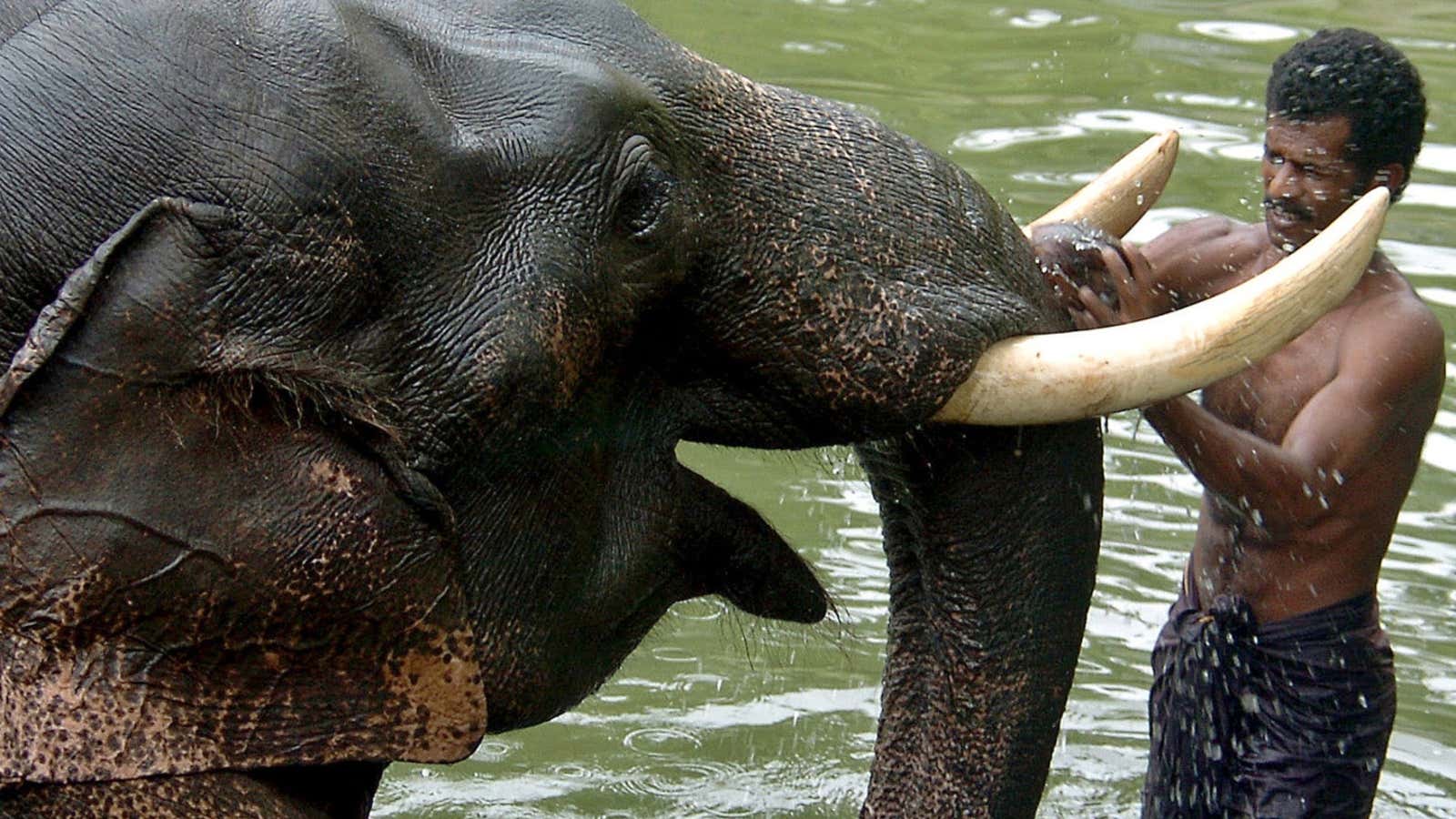A small, lush corner in southern India’s Kerala state is up in arms. The tribal community of this tropical region, called Attappadi, in Palakkad district is angry over an elephant—especially his name.
Relocated to an elephant farm around 180 kilometres south in Kodanad, near the city of Kochi, the 27-year-old, majestic looking tusker, roamed the Attapadi Reserve Forest till as recently as April 2018, when he was captured by forest officials, and rechristened Peelandi Chandru.
He was trapped and shifted following complaints from the area’s settler community that he had destroyed their cash crops and even killed nine people.
And as long as he roamed free, he was known only as Peelandi. Named after a tribal elder killed in an elephant attack, the animal was an inseparable part of local life. His powerful presence in the neighbourhood was deemed a good omen amidst adversities, over the years even giving him a divine status.
“We were extremely sad when he was captured last year using Kumki (trained captive) elephants. Many of us cried when he was taken to Kodanad,” recalls Rangan, a village elder of Attapadi’s Sambarkod tribal colony where Peelandi once roamed.
But that wasn’t all. The tribals, already orphaned by Peelandi’s absence, were in for more humiliation. Last May, soon after the capture, the Kerala forest department rechristened the elephant. As expected, they chose a name reflecting Brahminical traditions, “Chandrashekharan” (Sanskritik name for Hindu god Siva), which is alien to adivasi, or tribal, vocabulary.
Captured elephants, including Kerala’s famous temple elephants, almost always carry mainstream Hindu names. Forest officials say it is an old practice to name them after retired or late officials or their immediate family members.
However, what it did this time—and probably in previous such instances, too—was to entirely wipe out Peelandi’s adivasi connections, along with his freedom.
Ever since the rechristening, Attappadi’s tribals have been protesting through meetings and sloganeering. Complaints have piled up at state chief minister Pinarayi Vijayan’s office, seeking his intervention to reclaim the tusker’s “indigenous identity.”
Identity theft
This Attappadi rebellion is symptomatic of a larger conflict that has been playing out in India and other parts of the world: one between cultures and identities of marginal communities and those of, what are deemed, mainstream ones.
For long, appropriation of identities and assets by the privileged has been among the key challenges faced by aborigines across the world. The angry lamentation by a native woman amidst the raging Amazon forest fire in Brazil is only the latest evidence of such marginalisation.
Tribal regions in India are no exception.
Rechristening—often with casteist underpinnings—of individuals, places, and deities of the local community is a part of this process of appropriation.
Like in Attappady, Kerala’s other tribal areas such as Wayanad and Idukki, too, have witnessed this phenomenon. Often, it is religious conversions and re-conversions that lead to renaming of tribals with new Christian or Brahmanical names. A Bomman of Wayanad, for instance, becomes Joseph following conversion. Hindu nationalist groups, too, fuel this phenomenon.
In some instances, powerful lobbies with commercial interests, in association with the state machinery, have attempted to ravage entire landforms hitherto treated as gods by locals. The Niyamgiri agitation in the eastern Indian state of Odisha is emblematic of this.
In Kerala, one of India’s most socially advanced states, aborigines form 1.45% of the 33.4 million population (2011 Census), but have remained alienated. Powerful settlers have incessantly encroached their land, livelihoods, and lifestyles, pushing them further and further to the margins.
Attappadi, in fact, is one tribal block where natives have turned into a minority from constituting almost 90% in 1951. Today they live in 192 different settlements spread across Attappadi—clans include the Irulas, Mudugas, and the Kurumbas—cultivating horse gram, millets, maize, pulses, and vegetables.
They have their own rich culture and have lived harmoniously with nature for centuries—till the settlers began appearing.
It is in this context that Peelandi and his renaming must be viewed.
“The settler community was upset because the elephant had destroyed their banana plantations,” said S Pazhaniswamy, a tribal folk musician of Attappadi.
The tribals also say there is little merit to allegations that Peelandi killed nine people.
As for his new name, they say it only reflects the officials’ feudal mindset. “Like tribals everywhere else, we, too, are being denied the right to choose names for ourselves. Each tribal name is a declaration to the world of who we are,” said Rangan of Sambarkod.
While the task before them is daunting, they get help from some organised outsiders, too.
“All captured elephants in Kerala have Brahminical names such as Guruvayur Kesavan, Sankaranarayanan, Gopalakrishnan, Rashmi, and Nandini. Why don’t we name them Peelandi, Podichi, Chirutha, Vellachi, and Marutha as a show of solidarity with the tribal community?” asks Boban Mattumantha, chairman of the Palakkad district Paristhithi Aikya Vedi which is helping the adivasis take up the matter at higher levels.
The middle ground
Earlier this month, the issue took a curious turn. Giving in partially to the tribals’ pressure, and that of environmentalists and social workers, the principal chief forest conservator of Kerala (wildlife) issued an order on Aug. 13, rechristening Peelandi or Chandrasekharan as Peelandi Chandru—some kind of middle ground, according to officials.
The tribals are not happy, though. “Peelandi got his identity back but only partially. He still has to carry the elitist tail, Chandru. Why are they not ready to restore his old name fully? It reminds us of the casteism still prevailing among officials,” says Rangan.
Today, residents of Sambarkod, Upper Sambarkod, and Bodi Challa tribal colonies in Attappadi, are facing a huge vacuum in their life with Peelandi’s absence. On Nov. 7 last year, 54 elders and 11 children from Attappadi made headlines when they travelled on a special bus to Kodanad to pay respects to the tusker. There, they bowed before the elephant with folded palms and called him bhagawan (god) and swamy (lord).
A partly converted god, that is.
